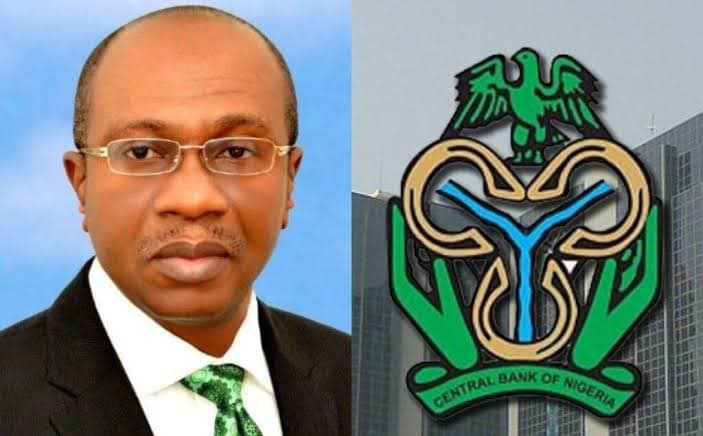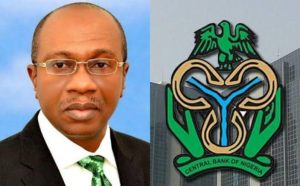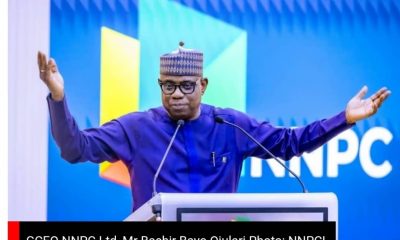Business
WHO IS AFRAID OF GODWIN EMEFIELE?

WHO IS AFRAID OF GODWIN EMEFIELE?
HE’S NOT EVEN SNEEZING AND J
kTHEY ARE CATCHING THE COLD! J
STATEMENT BY FRIENDS
OF GOVERNOR EMEFIELE
In the past few weeks, there have been media reports on the purported interest of the Governor, Central Bank of Nigeria (CBN), Mr. Godwin Emefiele, in the 2023 presidential race, leading to stampede by interested parties and vested interests who are resorting to all sorts of blackmail, sponsored articles and choreographed comments on socialmedia targeted at tainting Godwin Emefiele’s image, impugning his character and legacy.
Clearly, the negative attacks are being sponsored by those who see Emefiele as a major threat to their political ambition. Truth is Godwin Emefiele has not confirmed to anyone he is running for President even as he is constitutionally qualified to do so; he has been under pressure in the past few weeks as different groups have been putting up unsolicited campaign for his candidacy. Only yesterday, as the speculation became widespread, a group of his friends under the aegis of FRIENDS OF GODWIN EMEFIELE met with him to clarify his position.
Here is what he told us –
- That he remains focused on his job and will continue supporting the Muhammadu Buhari-led federal government’s economic recovery drive;
- That in his career trajectory, right from his days as a young banker, he never asked, nor lobbied for a job- he was invited by the Board of Directors to be the Chief Executive Officer/Group Managing Director of ZenithBank as he was an integral part of the team, Led by founder Jim Ovia, that transformed Zenith Bank from a start-up to one of Africa’s largest banks with subsidiaries in Ghana, Sierra Leone, Gambia, South Africa, Dubai, China and the United Kingdom;
- In 2014, President Goodluck Jonathan tapped him to be the CBN Governor, a job he didn’t lobby for and in which his name was not among those being considered at that time. He was not even from the geo-political zone that most people thought the job would go to as the president then was from same geopolitical zone with him;
- Today he remains humbled by President Muhammadu Buhari’s decision to grant him an unprecedented second term as CBN Governor- again without lobbying. Thus he will continue to remain loyal to him and the Federal Republic of Nigeria.
- Emefiele told us that he believes it’s the prerogative of President Muhammadu Buhari to plan his succession in line with global best practices for good governance for the continuing peace and progress of the federal republic of Nigeria, as such he will play his part to stabilise the economy for an orderly transition.
- And given that it’s God that anoints leaders, he will leave his faith firmly in the hands of God.
- With these fundamental questions settled, it is imperative to address some of the lies and utter falsehood being pedaled by blackmailers and political jobbers. Who Godwin Emefiele as a threat to their ambition.
FROM BEGINNING AS CBN GOVERNOR
Indeed, when Emefiele assumed the position of the CBN Governor in June 2014, his task was huge, the challenges seemingly insurmountable. Today despite huge headwinds he has calmed the waters and put Nigeria back on the path of growth.
SHARP FALL IN CRUDE OIL PRICE
As you will recall there was a sharp fall in crude oil prices from 2015, which led to significant revenue shortfalls in Nigeria where crude oil represents about 95 per cent of Nigeria’s export revenue. This created major shock for the Nigerian economy, leading to a 13-month recession in 2016. In comparison to the previous years before Emefiele became the CBN governor, the average price of crude oil from 2010 to 2014 was over $100/barrel and this fell to some $30 / barrel with high production costs of some $25/barrel. Despite these challenges Emefiele’s monetary policies supported the Buhari administration and all 36 State governments, ensuring salaries were paid and much more was done, with much less, in infrastructure, steering Nigeria away from much worse outcomes while many oil producers like Kuwait, Russia, Angola and Brunei had longer lasting recessions between of 20 – 60 months.
COVID-19 INDUCED GLOBAL RECESSION
Critics must also understand that the second recession the country entered into in 2020 was as a result of the COVID-19 pandemic. Then, the global economy (Nigeria inclusive) was plunged into recession because of the pandemic which was unprecedented. It led to declines in economic activities and lockdown across the world Countries like the USA had GBP falling in 2020 by MINUS 31% in Q2, UK by MINUS 19.4% in Q2, EU by MINUS 14.1% in Q2 and Nigeria , with deft response of the CBN had MINUS 6.1% in Q2. As we all know the CBN supported fiscal authorities in the following areas.
N100 billion health sector credit facility for operators in the sector. Today, Nigeria boasts of two world-class cancer centres in Lagos and medical tourism has reduced.
- A one-year extension of a moratorium on principal repayments for CBN intervention facilities;
- The reduction of the interest rate on intervention loans from 9 percent to 5 percent;
- Strengthening of the Loan to Deposit ratio policy (i.e. stepped up enforcement of directive to extend more credit to the private sector);
- Creation of N400 billion target credit facility for affected households and small and medium enterprises; •Granting regulatory forbearance to banks to restructure terms of facilities in affected sectors;
- Improving FX supply to the CBN by directing oil companies and oil servicing companies to sell FX to the CBN rather than the Nigerian National Petroleum Corporation;
- Additional NGN100 billion intervention fund in healthcare loans to pharmaceutical companies and healthcare practitioners intending to expand/build capacity;
- Identification of few key local pharmaceutical companies that will be granted funding facilities to support the procurement of raw materials and equipment required to boost local drug production.
- N1 trillion in loans to boost local manufacturing and production across critical sectors;
DEVELOPMENTAL-ORIENTEDCENTRAL BANKER
But despite the challenges, the CBN under Emefiele has in the last seven years maintained a developmental- oriented approach in supporting the federal government to address challenges across various sectors of the economy and has initiated far-reaching reforms.
RICE PYRAMID
One issue the critics have continued to raise is the issue of the rice pyramid which was recently unveiled in Abuja. But these arm chair critics have failed to understand that through the Anchor Borrowers7 Programme (ABP), an initiative that was introduced by the Emefiele-led CBN, the lives of a lot of rural farmers have been transformed. The rice pyramid which had taken place previously in Minna, Kebbi, Gombe, Ekiti and Abuja, showed how Emefiele has used agriculture to support the federal governments wars on insecurity. The rice pyramids were build bag by bag in all the states the programme had been launched since December 2020, when it was first launched in Minna, Niger State. The programme held last month to unveil the world’s largest rice pyramid in Abuja was also an initiative of the Rice Farmers Association of Nigeria (RIFAN).
ANCHOR BORROWERS7 PROGRAMME
The ABP has been described as a major agricultural breakthrough and a source of pride to the country, as farmers, especially rice farmers, have continued to count gains under the scheme. The programme has increased banks7 finance to the agricultural sector and enhanced capacity utilisation of agricultural firms. From an average yield of 1.8 metric tonnes per hectare in the pre-ABP era, the initiative has increased the country’s average yield per hectare for rice paddy and maize to about five metric tonnes per hectare.
REDUCTION IN IMPORT BILL
Additionally, there has been a significant reduction in the country’s rice import bill, from a monstrous $1.05 billion prior to November 2015, to the current figure of $18.50 million, annually.
TAMING COVID-19
The disruption caused by the COVID-19, which also contributed to the significant drop in the price of crude oil exposed the economy’s weak underbelly. In Nigeria, the Emefiele-led CBN acted swiftly, almost when the first case broke out in the country, by unveiling a raft of policy initiatives aimed at reducing the adverse impacts of the COVID-19 pandemic on the economy.
CACOVID
Emefiele also spearheaded the creation of the Coalition Against COVID-19 (CACOVID), an initiative that brought all the private sector business leaders under an umbrella in the fight against the spread of the pandemic. This was why in its latest Article IV Consultation released in February 2022, the International Monetary Fund praised Nigeria’s effort in fighting the spread of the virus.
OTHERS
There are many other measures announced by the CBN Governor which will be detailed in due course like the support to Technology, Digital innovation, the Creative Industries and the 15 Trillion Infrastructure corporation recently launched.
- CONCLUSION
Apparently, those behind the sponsored negative reports are afraid of Emefiele’s towering personality and service to Nigeria. But they must understand that he cannot be stampeded any way. He is focused on delivering the mandate of the Central Bank; he is rebuilding The economy of the country through import substitution policies and using agriculture to create a new rural middle class from ground up. . Those who continue to criticise the rice pyramid are too ashamed of giving glory to whom it is due. Emefiele is focused on his unfinished job and should not be distracted.
Signed
Friends of Godwin Emefiele
Business
Nigeria’s Inflation Drops to 15.10% as NBS Reports Deflationary Trend

Nigeria’s headline inflation rate declined to 15.10 per cent in January 2026, marking a significant drop from 27.61 per cent recorded in January 2025, according to the latest Consumer Price Index (CPI) report released by the National Bureau of Statistics.
The report also showed that month-on-month inflation recorded a deflationary trend of –2.88 per cent, representing a 3.42 percentage-point decrease compared to December 2025. Analysts say the development signals easing price pressures across key sectors of the economy.
Food inflation stood at 8.89 per cent year-on-year, down from 29.63 per cent in January 2025. On a month-on-month basis, food prices declined by 6.02 per cent, reflecting lower costs in several staple commodities.
The data suggests a sustained downward trajectory in inflation over the past 12 months, pointing to improving macroeconomic stability.
The administration of President Bola Ahmed Tinubu has consistently attributed recent economic adjustments to ongoing fiscal and monetary reforms aimed at stabilising prices, boosting agricultural output, and strengthening domestic supply chains.
Economic analysts note that while the latest figures indicate progress, sustaining the downward trend will depend on continued policy discipline, exchange rate stability, and improvements in food production and distribution.
The January report provides one of the clearest indications yet that inflationary pressures, which surged in early 2025, may be moderating.
Bank
Alpha Morgan to Host 19th Economic Review Webinar

Alpha Morgan to Host 19th Economic Review Webinar
In an economy shaped by constant shifts, the edge often belongs to those with the right information.
On Wednesday, February 25, 2026, Alpha Morgan Bank will host the 19th edition of its Economic Review Webinar, a high-level thought leadership session designed to equip businesses, investors, and individuals with timely financial and economic insight.
The session, which will hold live on Zoom at 10:00am WAT and will feature economist Bismarck Rewane, who will examine the key signals influencing Nigeria’s economic direction in 2026, including policy trends, market movements, and global developments shaping the local landscape.
With a consistent track record of delivering clarity in uncertain times, the Alpha Morgan Economic Review continues to provide practical context for decision-making in a dynamic environment.
Registration for the 19th Alpha Morgan Economic Review is free and can be completed via https://bit.ly/registeramerseries19
It is a bi-monthly platform that is open to the public and is held virtually.
Visit www.alphamorganbank to know more.
Business
GTBank Launches Quick Airtime Loan at 2.95%

GTBank Launches Quick Airtime Loan at 2.95%
Guaranty Trust Bank Ltd (GTBank), the flagship banking franchise of GTCO Plc, Africa’s leading financial services group, today announced the launch of Quick Airtime Loan, an innovative digital solution that gives customers instant access to airtime when they run out of call credit and have limited funds in their bank accounts, ensuring customers can stay connected when it matters most.
In today’s always-on world, running out of airtime is more than a minor inconvenience. It can mean missed opportunities, disrupted plans, and lost connections, often at the very moment when funds are tight, and options are limited. Quick Airtime Loan was created to solve this problem, offering customers instant access to airtime on credit, directly from their bank. With Quick Airtime Loan, eligible GTBank customers can access from ₦100 and up to ₦10,000 by dialing *737*90#. Available across all major mobile networks in Nigeria, the service will soon expand to include data loans, further strengthening its proposition as a reliable on-demand platform.
For years, the airtime credit market has been dominated by Telcos, where charges for this service are at 15%. GTBank is now changing the narrative by offering a customer-centric, bank-led digital alternative priced at 2.95%. Built on transparency, convenience and affordability, Quick Airtime Loan has the potential to broaden access to airtime, deliver meaningful cost savings for millions of Nigerians, and redefine how financial services show up in everyday life, not just in banking moments.
Commenting on the product launch, Miriam Olusanya, Managing Director of Guaranty Trust Bank Ltd, said: “Quick Airtime Loan reflects GTBank’s continued focus on delivering digital solutions that are relevant, accessible, and built around real customer needs. The solution underscores the power of a connected financial ecosystem, combining GTBank’s digital reach and lending expertise with the capabilities of HabariPay to deliver a smooth, end-to-end experience. By leveraging unique strengths across the Group, we are able to accelerate innovation, strengthen execution, and deliver a more integrated customer experience across all our service channels.”
Importantly, Quick Airtime Loan highlights GTCO’s evolution as a fully diversified financial services group. Leveraging HabariPay’s Squad, the solution reinforces the Group’s ecosystem proposition by bringing together banking, payment technology, and digital channels to deliver intuitive, one-stop experiences for customers.
With this new product launch, Guaranty Trust Bank is extending its legacy of pioneering digital-first solutions that have redefined customer access to financial services across the industry, building on the proven strength of its widely adopted QuickCredit offering and the convenience of the Bank’s iconic *737# USSD Banking platform.
About Guaranty Trust Bank
Guaranty Trust Bank (GTBank) is the flagship banking franchise of GTCO Plc, a leading financial services group with a strong presence across Africa and the United Kingdom. The Bank is widely recognized for its leadership in digital banking, customer experience, and innovative financial solutions that deliver value to individuals, businesses, and communities.
About HabariPay
HabariPay is the payments fintech subsidiary of GTCO Plc, focused on enabling fast, secure, and accessible digital payments for individuals and businesses. By integrating payments and digital technology, HabariPay supports innovative services that make everyday financial interactions simpler and more seamless.
Enquiries:
GTCO
Group Corporate Communication
[email protected]
+234-1-2715227
www.gtcoplc.com
-

 celebrity radar - gossips6 months ago
celebrity radar - gossips6 months agoWhy Babangida’s Hilltop Home Became Nigeria’s Political “Mecca”
-

 society6 months ago
society6 months agoPower is a Loan, Not a Possession: The Sacred Duty of Planting People
-

 society5 months ago
society5 months agoReligion: Africa’s Oldest Weapon of Enslavement and the Forgotten Truth
-

 news6 months ago
news6 months agoTHE APPOINTMENT OF WASIU AYINDE BY THE FEDERAL GOVERNMENT AS AN AMBASSADOR SOUNDS EMBARRASSING










